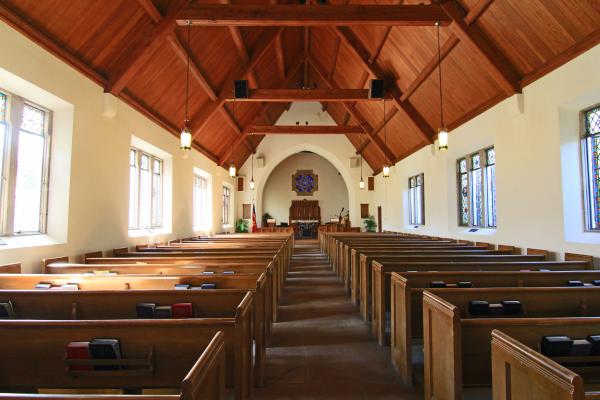In a time of crisis, religious institutions often support and uplift those suffering. It’s why both Vice President Mike Pence and former President Barack Obama held virtual meetings with faith leaders to thank and encourage them in their work. While there is great opportunity for churches in the U.S., the conditions of the coronavirus pandemic and economic collapse mean they also face great risk of closure.
The threat to churches across the country, especially churches in low-income areas, caused Justin Giboney, president of the AND Campaign, to start the Churches Helping Churches Challenge. The goal: raise $500,000 in the month of April from financially secure churches, and distribute one-time grants to small churches with financial hardship.
“I think it's pretty clear that Christians, especially in times of crisis, are supposed to be taking care of one another,” Giboney said. “It’s very clear that a lot of these smaller churches aren't going to make it, but for the larger churches, seeing it as their responsibility to step in and to show that love isn't just a Hallmark card or saying, ‘bless your heart,’ that love is actually self-sacrifice.”
The homepage of the Churches Helping Churches website displays this quote from Acts 2:45 on their website: “… and they began selling their property and possessions and were sharing them with all, as anyone might have need.”
Churches, like nonprofits and small businesses, face a lack of financing due to closures across the country. Throughout the month of April, most states have had stay-at-home orders, and those orders limit or restrict religious gatherings in all but seven states. When churches can’t hold in-person services, most see giving decrease. A March survey of protestant pastors found that 42 percent of churches reported giving was significantly down, while 28 percent said it was slightly down.
In addition to a lack of meetings, churches and their congregants face general economic collapse. Over the past six months, over 30 million Americans filed for unemployment benefits. The same survey reported that five percent of protestant pastors (which would equal thousands of churches) are unsure if they will survive this season.
Coupled together, if these challenges persist for multiple months, data suggest peril for many churches. Almost a fifth of Protestant churches had less than four weeks of reserves, and half of churches had reserves for 15 weeks or less, according to a 2018 survey from LifeWay Research.
“Most churches can weather [a typical recession], because it comes on more gradually and the full impact usually doesn't actually hit churches until the following year, and that's a lot of time to plan out and time to prepare,” Scott McConnell, executive director of LifeWay Research, said. “This is a very irregular time, because even though we won't hit [the official definition of a recession] for another quarter and a half, we all know we're in one. It’s happened very fast and very deep … because it's much less gradual, I believe it’ll have a bigger impact on church closures.”
The survival of small churches is key to supporting communities, Giboney said. More than just worship services or spiritual encouragement, churches meet physical needs of their communities, from feeding people in their neighborhood to helping pay their congregants' bills.
“A lot of these smaller churches in low-income communities are the foundation, in a lot of ways, of that community,” Giboney said.
One such church is Hold The Light Ministries Church of God In Christ in West Detroit, led by Pastor Kato Hart Jr., which received a $3,000 grant from the Churches Helping Churches Challenge. Half of the Hold The Light congregation members have lost their jobs or seen significant cuts to their paid work hours.
“The grant that we received was a blessing,” Hart said. “The grant has given us the ability to catch up on our utility bill … to catch up on our lease, trying to maintain that with the little funds we have … and we got to help some of the members of our church.”
The Church Of God In Christ (COGIC) denomination, the largest predominantly African-American church, is one of the many groups to partner in the Churches Helping Churches Challenge, along with the Jude 3 Project, the National Hispanic Christian Leadership Conference, and the American Bible Society, among others. The National Christian Foundation will be in charge of administering the grants, directing 100 percent of proceeds to the grant recipients. As of April 28, they had reached $401,000 of their $500,000 goal.
Devin and Samantha Westbrook, a husband and wife team who pastor Redemption Church in Memphis, Tenn., are using their grant money to pay their bills and staff members, along with other community needs. Since canceling in-person worship, they’ve been unable to pay the band members and have implemented staff pay reductions.
“We have some on staff that we had to ask to take a reduction … we had to lay people off ourselves,” Devin Westbrook said. “We want to help meet the needs of those (we had to layoff).”
Since receiving the grant, they’ve told other churches about the opportunity, trying to make sure as many as possible know about the grants. They’ve also been connecting with other churches in the community by helping them transition to online worship services.
“Where we may not have the capital, we have the creativity. If every ministry is willing to give what they have, we’ll all be great,” Samantha Westbrook said.
Her husband agreed, “We don’t have a lot of things that a lot of other ministries have … being resourceful in this season has benefitted us to a great degree and we try to share that knowledge,” he said.
The grants are awarded with no strings attached. Applying churches can meet the minimal theological criteria by affirming the Apostles Creed, the Lausanne Creed, or by submitting their own statement of faith. The only other criteria include being in a low-income area or a COVID-19 federal disaster zone, being registered as a religious nonprofit in their state, and a short explanation of how funds will be used. They equally consider churches regardless of denomination.
The website will later list the churches who received grants to ensure transparency. While the challenge is focused on the one-time goal, they have had conversations about how to continue beyond April.
Giboney said the CHCC hopes to initiate greater unity across churches, and greater communication between small and large churches in the same cities. Their website has a “Best Practices” page that advises churches on how to foster a relationship with those on the other side.
“As relief comes in, we want to make sure that (churches) are helping one another and learning from one another,” Giboney said. “We truly believe there are things a smaller church can provide to a larger church, whether that's understanding about cultural issues or things that they may be going through. We think it's a mutually beneficial relationship.”
Got something to say about what you're reading? We value your feedback!






